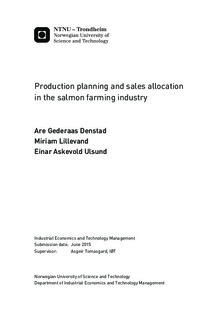Production planning and sales allocation in the salmon farming industry
Master thesis
Permanent lenke
http://hdl.handle.net/11250/2352981Utgivelsesdato
2015Metadata
Vis full innførselSamlinger
Sammendrag
In this thesis a multistage stochastic optimization model has been developed for production planning and sales allocation within the salmon farming industry. To the authors knowledge, an optimization model for this problem has not been developed before.
The background for this thesis is a tactical planning problem spanning production and sales under uncertainty. The goal is to identify profitable solutions that are sufficiently flexible in accounting for this uncertainty.
The model is inspired by the work done by Hæreid (2011), but addresses more aspects of the value chain. The most important innovations in the model is that processed products and inventory management is included. Furthermore, the scope are extended to include global operations. Additionally, the model offers a more detailed modeling of contract and transport decisions. The model also incorporate both market and product price dependencies.
The model is implemented in two versions: one deterministic and one three-stage stochastic version. To illustrate how they can be used, the different models are tested on instances inspired of Marine Harvest's global production network. The input data used are however based on publicly available information. To model uncertainty in salmon price and sea water temperature, different seasonal ARIMA-models are used to model these uncertain time series. Based on these forecasts, residual scenarios are generated by using a copula-based scenario generation heuristic.
The developed model acts according to the authors initial assumptions and gives reasonable results compared to how the industry operates as of today. The value of including stochastic programming constitutes 5 % savings, and tests indicate that the model holds in-sample stability.
